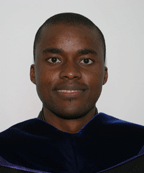Home > Press > UAlbany NanoCollege Graduate Selected for Prestigious Fellowship from National Research Council
 |
| Dr. Chaffra Awo-Affouda |
Abstract:
Dr. Chaffra Awo-Affouda will conduct spintronics research at Naval Research Lab in Washington, DC
UAlbany NanoCollege Graduate Selected for Prestigious Fellowship from National Research Council
Albany, NY | Posted on October 25th, 2007The College of Nanoscale Science and Engineering ("CNSE") of the University at Albany announced today that Dr. Chaffra Awo-Affouda, who graduated from CNSE in May with a Ph.D. in Nanoscale Science, has been selected to receive a prestigious postdoctoral fellowship from the National Research Council ("NRC").
Working in the Materials Science and Technology Division of the Naval Research Laboratory ("NRL") in Washington, DC, Dr. Awo-Affouda is conducting research in the emerging field of spintronics, which is focused on harnessing the spin of the electron in solid state electronic devices. The spin of the electron is responsible for magnetism and magnetic storage technology, including the giant magnetoresistive read heads used in modern hard disk drives. Researchers now believe that utilizing the spin of the electron in applications such as data processing may help to extend Moore's Law in the post-CMOS era.
The highly competitive NRC Associateship Programs provide advanced training for exceptionally qualified postdoctoral and visiting scientists, while enhancing the research conducted in federal laboratories. Dr. Awo-Affouda will receive funding for the next two years to pursue pioneering research that will help advance the nanoelectronics industry.
"I congratulate Dr. Awo-Affouda on receiving this prestigious fellowship, which is emblematic of the unparalleled academic and research programs and first-rate opportunities available to students at the UAlbany NanoCollege," said Dr. Alain E. Kaloyeros, Vice President and Chief Administrative Officer of CNSE. "It is also a great tribute to the scholarly excellence of CNSE's world-class faculty, including Professor Vincent LaBella, whose expertise and guidance were critical contributions to the success of Dr. Awo-Affouda."
"This fellowship is an amazing opportunity for Chaffra. It will enable him to make an immediate impact in the emerging science of nanotechnology, and specifically in the dynamic world of spintronics," said Dr. Vincent LaBella, CNSE Associate Professor of Nanoscience. "It is a source of great pride to know that Chaffra's educational experience at CNSE has opened the doors to a wonderful opportunity that will truly benefit his future."
"Working at the NRL is a prestigious stepping stone for me. The research performed here corresponds exactly to my interests," said Dr. Awo-Affouda. "I'm most grateful for my learning experience at CNSE. My interactions with the diverse faculty helped me to develop the critical thinking required for this type of career, and the research facilities were definitely helpful in gaining the technical expertise required for my job."
A native of Cotonou, Benin, Dr. Awo-Affouda received his bachelor's degree in electrical engineering in France and a master's degree in the same field at Union College. Earlier this year, his doctoral dissertation earned him the UAlbany Distinguished Dissertation Award.
####
About UAlbany CNSE
The UAlbany CNSE is the first college in the world dedicated to research, development, education, and deployment in the emerging disciplines of nanoscience, nanoengineering, nanobioscience, and nanoeconomics. In May 2007, it was ranked as the world's number one college for nanotechnology and microtechnology in the Annual College Ranking by Small Times magazine. CNSE's Albany NanoTech complex is the most advanced research facility of its kind at any university in the world: a $4.2 billion, 450,000-square-foot complex that attracts corporate partners from around the world and offers students a one-of-a-kind academic experience. The UAlbany NanoCollege houses the only fully-integrated, 300mm wafer, computer chip pilot prototyping and demonstration line within 65,000 square feet of Class 1 capable cleanrooms. More than 1,800 scientists, researchers, engineers, students, and faculty work on site at CNSE's Albany NanoTech complex, including IBM, AMD, SONY, Toshiba, Qimonda, Honeywell, ASML, Applied Materials, Tokyo Electron, and Freescale. An expansion currently underway will increase the size of CNSE's Albany NanoTech complex to over 750,000 square feet, including over 80,000 square feet of Class 1 cleanroom space, to house over 2,000 scientists, researchers, engineers, students, and faculty by the end of 2008.
For more information, please click here
Contacts:
Steve Janack
Phone: 518-956-7322
Copyright © UAlbany CNSE
If you have a comment, please Contact us.Issuers of news releases, not 7th Wave, Inc. or Nanotechnology Now, are solely responsible for the accuracy of the content.
| Related News Press |
Academic/Education
![]() Rice University launches Rice Synthetic Biology Institute to improve lives January 12th, 2024
Rice University launches Rice Synthetic Biology Institute to improve lives January 12th, 2024
![]() Multi-institution, $4.6 million NSF grant to fund nanotechnology training September 9th, 2022
Multi-institution, $4.6 million NSF grant to fund nanotechnology training September 9th, 2022
Announcements
![]() NRL charters Navyís quantum inertial navigation path to reduce drift April 5th, 2024
NRL charters Navyís quantum inertial navigation path to reduce drift April 5th, 2024
![]() Discovery points path to flash-like memory for storing qubits: Rice find could hasten development of nonvolatile quantum memory April 5th, 2024
Discovery points path to flash-like memory for storing qubits: Rice find could hasten development of nonvolatile quantum memory April 5th, 2024
Grants/Sponsored Research/Awards/Scholarships/Gifts/Contests/Honors/Records
![]() Discovery points path to flash-like memory for storing qubits: Rice find could hasten development of nonvolatile quantum memory April 5th, 2024
Discovery points path to flash-like memory for storing qubits: Rice find could hasten development of nonvolatile quantum memory April 5th, 2024
![]() Chemical reactions can scramble quantum information as well as black holes April 5th, 2024
Chemical reactions can scramble quantum information as well as black holes April 5th, 2024
|
|
||
|
|
||
| The latest news from around the world, FREE | ||
|
|
||
|
|
||
| Premium Products | ||
|
|
||
|
Only the news you want to read!
Learn More |
||
|
|
||
|
Full-service, expert consulting
Learn More |
||
|
|
||








